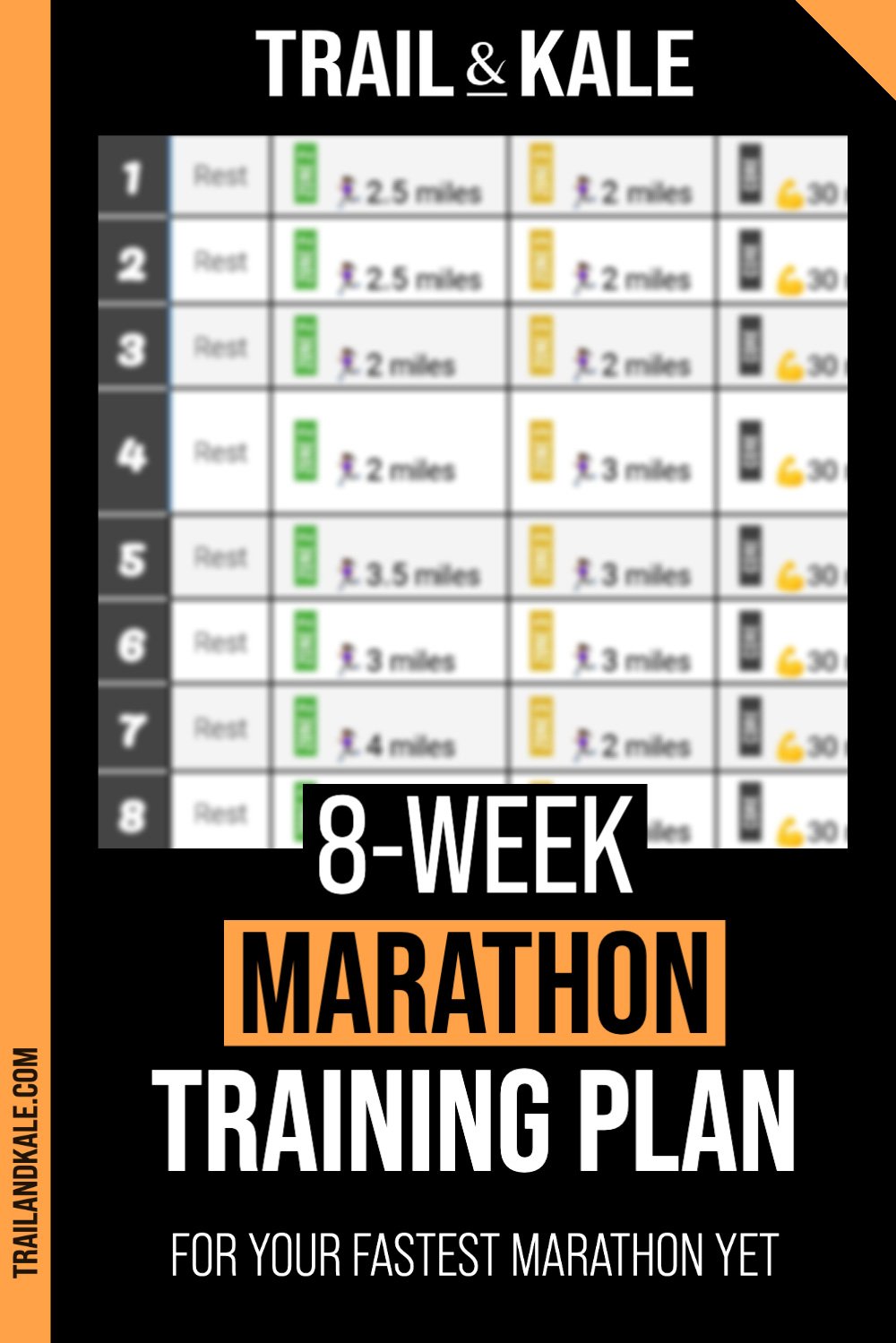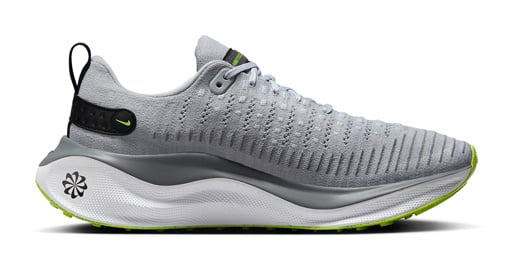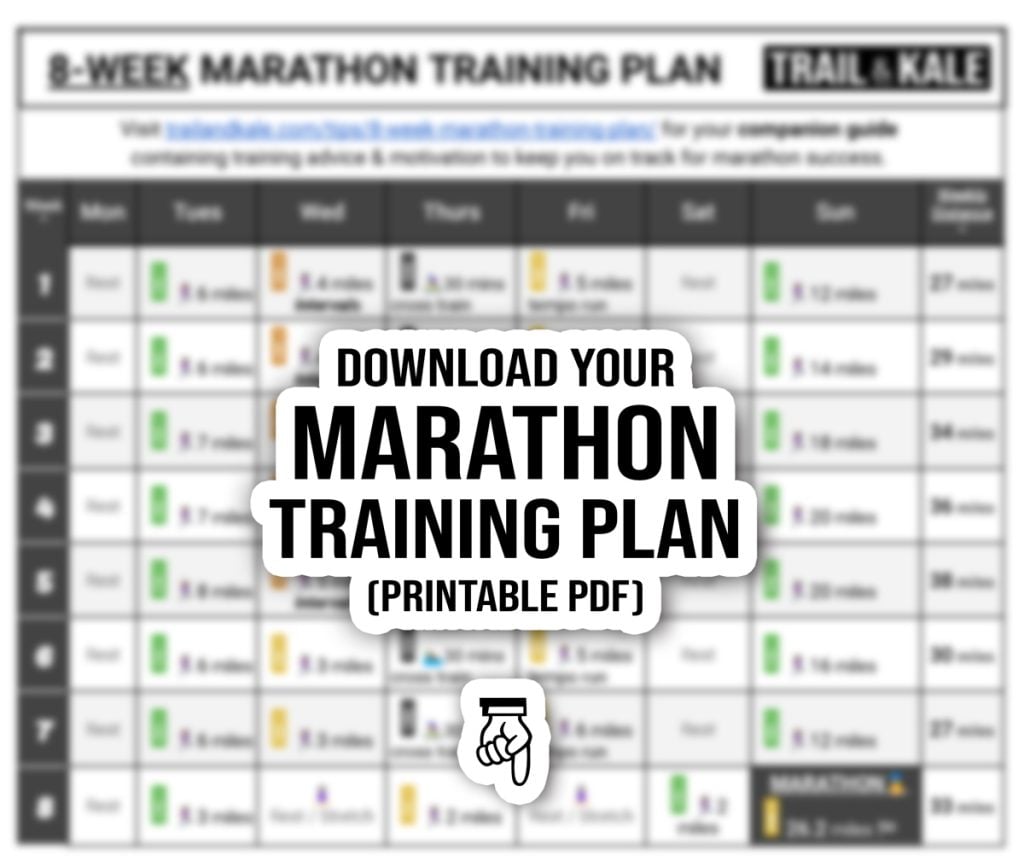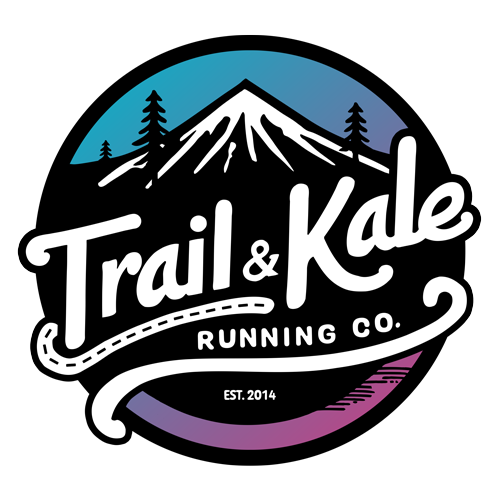I’m Alastair, one of the founders of Trail & Kale; I ran my first marathon over 10 years ago and have since gone on to run many marathons and ultramarathons all over the world.
By popular demand, I’m pleased to share this speed-focused 8-week marathon training plan for experienced runners with a strong running base – and not many weeks to fit training in before your next marathon race day!
This marathon training plan is a program designed for experienced runners who are already running regularly several times a week, and can comfortably run 10 miles or so in one go, where your primary marathon goal is to get a faster time and PR on race day.
This training plan will get you ready to run your next (and hopefully, fastest) marathon in just 8 weeks (2 months)!
This post is in partnership with Nike. If you’re looking for a supportive running shoe with enough cushioning and response to help you complete your half or full marathon training; the Nike InfinityRN 4 could be the perfect choice for you. Read my in-depth Nike InfinityRN 4 review to learn more.
What’s in this 8-week marathon training plan
- Who this 8 week intermediate marathon training plan is for
- Overview of our 8-week marathon training plan
- Gear up for your marathon training
- Advice to optimize performance, improve post-run recovery and prevent injuries
- Our FREE downloadable 8 week training plan pdf (printable)
- COMPANION GUIDE for this 8-week training plan
With this guide, you’ll have all the tools you need to start your marathon journey and achieve your goal of crossing the finish line.

Who this 8 week marathon training plan is for
If you run regularly, and can comfortably run 10 miles in one go then this 8 week marathon training plan is a great choice for you!
It is specifically designed to provide a clear and simple training plan structure for experienced runners looking to train to run faster over the marathon distance, to achieve your fastest marathon time yet!
You don’t necessarily have to have run a marathon before, but should have enough running experience that you’ve probably done at least one, if not several half marathons in the last few years and won’t find doing 4+ runs a week (including speedwork, tempo runs and increasingly longer ‘long’ runs) overly taxing on your body as you ramp up your marathon training over a relatively short 8-week period.
If you have a little more time to prepare for your marathon and have a specific marathon finish time goal in mind, then you may also want to consider doing our 3-month, 12 week marathon training schedule, or even our 4-month, 16 week marathon training schedule.
If you’re a less experienced runner and none of these situations sound like where you’re at in your run training then head back over to our marathon training plan database and choose one of our other plans that fits your experience level and goals, from beginner through to expert!
For example, we have great 16-week marathon training plan and 20-week marathon training plans that both provide a more gradual ramp-up in weekly mileage which is great for newer runners.
If you’re interested in running 5k, 10k, a half marathon or even your first ultramarathon then head over to our training plans homepage after reading this post.
Overview of our 8-week marathon training plan
This training plan is designed to help you build up running endurance, strength and mental stamina to be able to run a marathon in just 8 weeks, with a focus on speed training to help you work towards your fastest marathon time yet!
Do you have a time goal in mind? This chart should help you predict roughly what your potential marathon time could be based on your average pace:
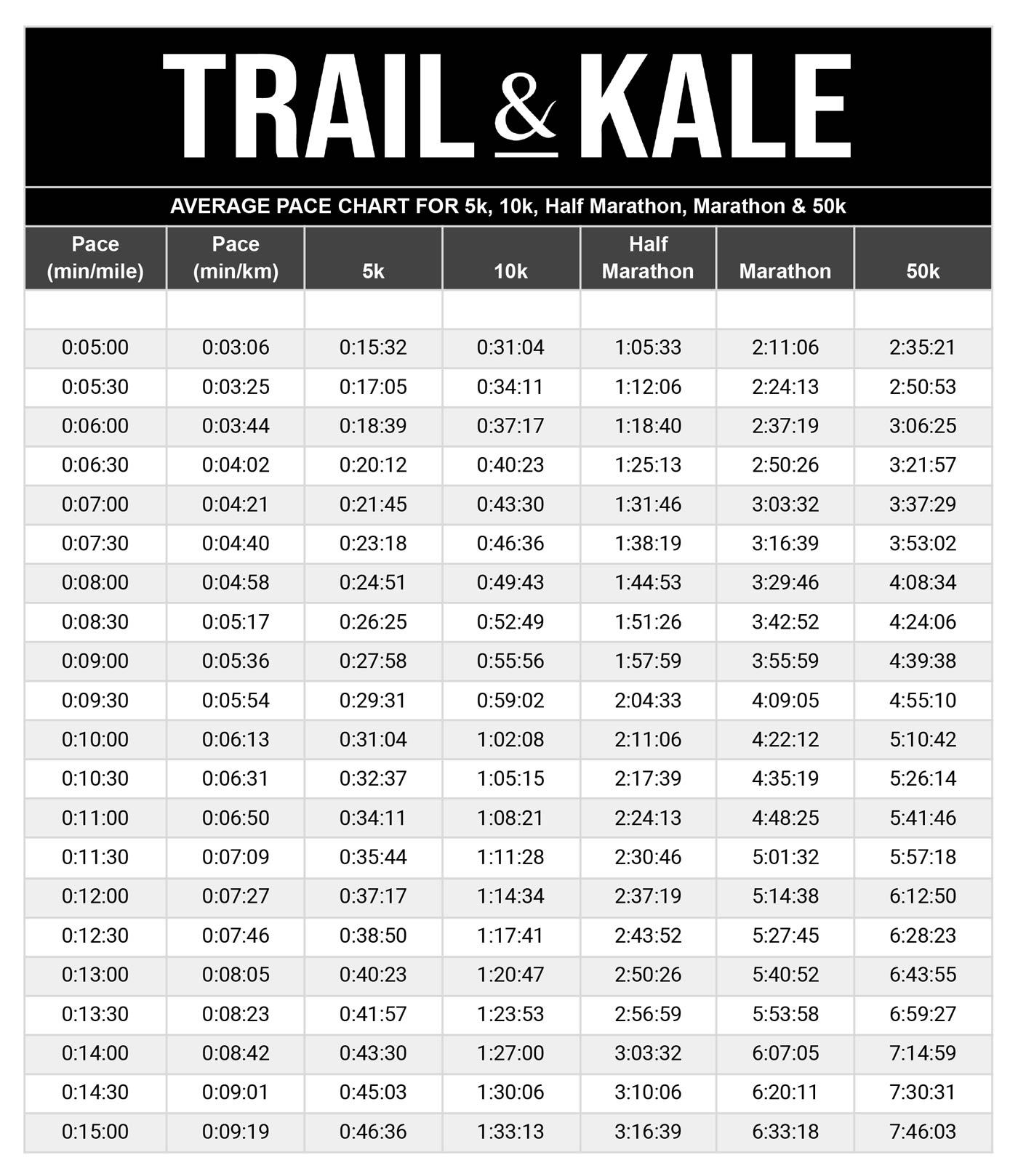
To learn more about marathon pace ranges and estimated marathon finish times to give you an idea of how much time it may take you to run a marathon, head over to our marathon training plans overview post.
That post also includes pace charts and information on average finish times for male and female runners.
How the plan is structured
This is an 8-week marathon training plan and much like our other marathon training schedules, the plan is structured so that you do several runs a week, of different durations and intensities.
In this 8-week schedule, you’ll do 4 runs a week.
At the end of each week, your training plan will include a ‘long run’.
The long run is an important one because it will train your body and mind to run longer durations (and distances) each week, as you build up the strength and confidence to run the full marathon distance.
The longest training run you’ll do in this marathon training schedule is 20 miles, and this will be the longest run before you reduce your mileage to taper down in preparation for your 26.2 mile race day!
This 8-week marathon training schedule also includes cross-training and rest days. These are also important components for your overall endurance and recovery.
Heart rate zone training
All of our marathon training plans take advantage of the benefits of using heart rate zone training as a highly effective way to plan, monitor and track running effort levels and performance over time based on your own personal level of fitness.
Heart rate training is personalized to you based on your individual heart rate, and provides ranges for you to train within, called ‘zones’.
Read our easy to follow guide to heart rate zone training to learn how to work out your heart rate zones, and how to track your heart rate while you’re running to ensure you’re in the target heart zones as outlined in our downloadable training plan below.
Gear up for your marathon training
Given you already run regularly, you probably have some (or all) of these already, but it helps to review a checklist just in case:
- A quality pair of running shoes
- Running socks
- Running tights or shorts
- For women, a running-appropriate sports bra
- A running tee or vest
- A running watch with a wrist-worn heart rate monitor
- A waterproof running jacket
- Running sunglasses
- A technical running hat
Also consider warm running gloves, an insulated winter running hat, and a warm baselayer such as a merino wool tee for running in the cold.
If you’re looking for a supportive running shoe with enough cushioning and response to help you complete your half or full marathon training; the Nike InfinityRN 4 could be the perfect choice for you!
Read my in-depth Nike InfinityRN 4 review to learn more.
A good running headlamp is essential and a reflective running vest is a good idea if your runs will involve running in the dark or low-light.
Advice to optimize performance, improve post-run recovery and prevent injuries
The following tips for before, during, and after your training runs will enable you to maximize each training session while preparing for your marathon race.
Before your run: Readiness, fuel, and dynamic stretching
Be prepared – prepare in advance by gathering your running essentials such as your shoes, clothes, watch, and accessories, particularly if you plan to run early in the morning.
Eat the right food before your run – Prior to your weekly long runs, make sure you eat a sufficient meal to maintain your energy levels throughout the run.
Dynamic stretching – Don’t forget to incorporate dynamic stretching into your 5-10 minute pre-run warm-up routine. We recommend following our suggested pre-run dynamic stretches, which are demonstrated in our stretches for runners post.
During your run: Technique, heart rate monitoring, and nutrition
Develop good running technique – focus on ensuring you’re working on efficient breathing, running form and cadence as you run.
Monitor your heart rate – our marathon training plans are most effective for runners who are able to monitor their heart rate using a running watch. We’re big proponents of heart rate zone training, as it’s personalized to your own heart rate data so you can ensure you’re running each run at the right level of intensity.
Nutrition as you run – it’s a good idea to take water with you for every run, except, perhaps, those shorter runs in cold weather. You can carry water in a running belt or hydration pack.
Energy gels and chews are a popular and convenient option for fueling those longer runs lasting over one hour.
After your run: Static stretching, recovery, and injury prevention
Static stretching – do some static stretching after you finish each run. It will help with flexibility and reduce post-run soreness, which can in turn help reduce the chances of injury. These are our favorite static stretches.
Post-run recovery shake – drinking a plant-based protein shake after those longer and harder runs will also make a big difference in reducing post-run soreness and helping with recovery. I suggest having one after every run that lasts over an hour.
Get plenty of rest and sleep – getting enough sleep and actually resting on your rest days will help you recover quicker. Our guide on how to sleep better is full of tips that should help!
Our FREE downloadable 8-Week Marathon Training Plan pdf (printable)
COMPANION GUIDE for our 8-week marathon training schedule
Our 8-week training plan is designed to be simple to follow and prioritizes running consistency and the importance of your weekend long run to train yourself physically to be able to run the full marathon distance, as well as develop the mental stamina to go the distance.
Train using heart rate zones
Effort levels for each run are specified based on ensuring you’re running in target heart rate zones 2, 3, or 4, which you’ll monitor using a running watch that tracks your heart rate.
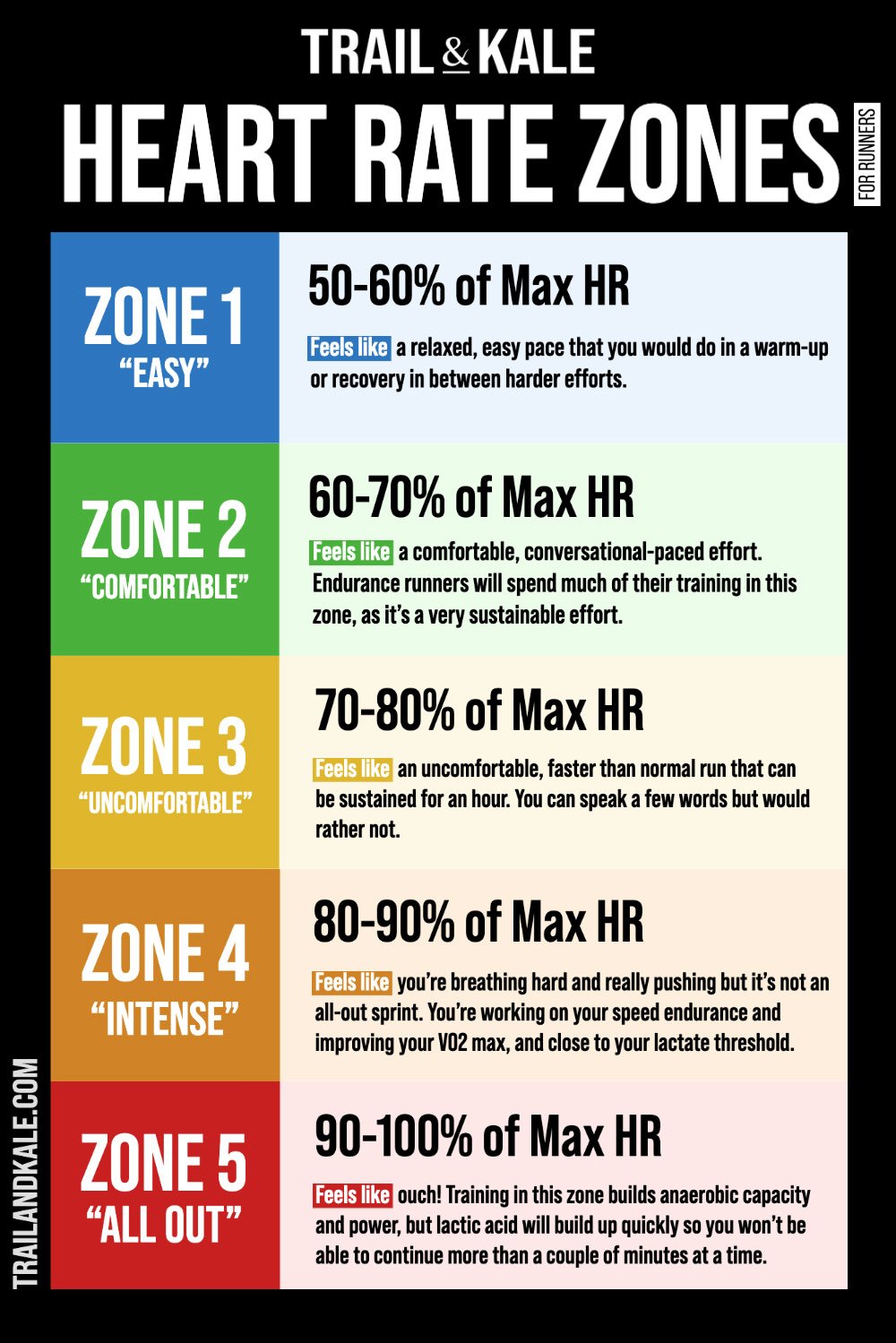
Read our heart rate training post to learn how to calculate your personalized heart rate zones, which is an essential part of how and why our training plans work so well.
You can also use this training plan without specifically using heart rate zones and tracking your heart rate, if you wish, but you’ll need to gauge your effort level based on your perceived effort, rather than using heart rate data.
Easy runs
Your long run and Tuesday ‘easy run’ are run at Zone 2, or ‘comfortable, conversational pace’.
You can, of course, run these runs on pavement, and that’s what I do for my long run, but for the easy run I sometimes like to throw in a few solid trail runs to mix up my training and take the opportunity to spend some quality time in nature.
Speed interval runs
Your Wednesday speed interval training session will have you working up to a Zone 4! Nobody said interval training was hard (or pretty), but the pace gains you’ll get from this weekly speedwork session will make it worthwhile!
You can choose whether to run your speed intervals over a set time (eg 4 minutes at speed, 4 minutes to recover, and repeat) or distance (0.5 miles at speed, 0.5 miles to recovery, and repeat).
My personal preference is to run speed intervals based on time, and when you’re training for a marathon I find longer intervals are more effective at training your body to run faster while sustaining that pace for longer periods of time.
So, a typical session you can follow would go like this:
- Warm up for 5 minutes, including some dynamic stretching
- Run 4 minutes at the fastest speed you can sustain for that time
- Recover by running at a comfortable pace for 4 minutes, being sure to get your breath back
- Repeat your fast and slow 4 minute intervals x4, for a total of 32 minutes
- Cool down for 3-5 minutes
- Do static stretches before ending the session.
Tempo runs
Your Friday run is run in Zone 3, at a ‘tempo run‘ pace, which is intended to be uncomfortable but sustainable for the duration of the scheduled run time.
Doing these more intense runs will help you run faster and improve your VO2 max.
If you get into this training plan and start to find it a little too intense in terms of the number of running days each week, and you crave longer recovery times, then modify this training plan.
The best way to do this is to drop either the speed intervals or tempo run session and take that day as a cardio cross-training or core strength day instead. Just don’t skip your long run (unless you’re injured and you have to)
Warm up and cool down
Before every run, spend at least 5 minutes doing a warm up, which should include dynamic stretching.
After every run, spend 5 minutes cooling down until your heart rate is back comfortably in Zone 1. Then spend at least another 5 minutes doing some static stretches to help reduce soreness and promote flexibility and range of motion.
Our guide to stretches for runners lists our favorite dynamic and static stretches.
Core and strength exercises
Thursday is your training plan’s ‘core and cross training’ day.
This session should be around 30-45 minutes long, and primarily focus on ‘easy’ cross-training such as riding a static bike, hiking or swimming, with 5-10 minutes of core/abs work.
Rest days
Monday and Saturday are your rest days, except for the day before your marathon race where there’s a short 2 mile easy ‘shakeout run’ to keep your body moving.
This doesn’t mean you shouldn’t do some activity, though, but take those days off from running. Depending on how you feel, you could do some yoga, breathwork, or stretching to help maintain flexibility.
Happy training!
I’m excited for your marathon training journey and hope you find this 8-week marathon training program to be an easy-to-follow and enjoyable companion along the way!
Pin this post!
